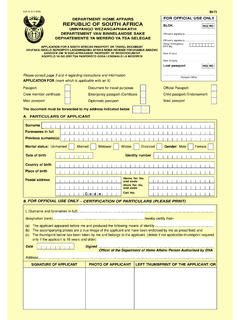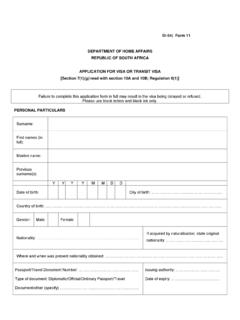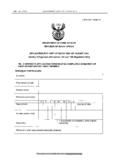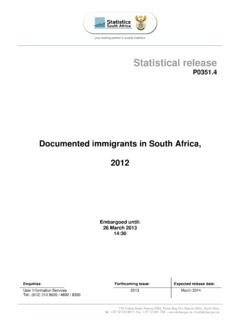Transcription of NEW NATIONAL PARTY OF SOUTH AFRICA v ... - …
1 NEW NATIONAL PARTY OF SOUTH AFRICA v GOVERNMENT OF THE republic OF SOUTH AFRICA AND OTHERS CCT 9/99 THE DEMOCRATIC PARTY v THE MINISTER OF home affairs AND ANOTHER CCT 11/99 Explanatory Note The following explanation is provided to assist the media in reporting this case and is not binding on the Constitutional Court or any member of the Court.
2 In two separate applications, the New NATIONAL PARTY (NNP) and the Democratic PARTY (DP) applied to the Constitutional Court for leave to appeal against the judgments of the Cape High Court and the Transvaal High Court respectively. The parties sought an order declaring the provisions of the Electoral Act unconstitutional, because people could not use identity documents issued to them in terms of old legislation to identify themselves, which would enable them to register and vote in the forthcoming general elections on 2 June 1999.
3 As these were matters of considerable public importance and had a bearing on the integrity of the forthcoming elections, the Court was prepared to deal with them as matters of urgency, and as if leave to appeal had been granted. Justice Yacoob and Justice Goldstone, on behalf of the majority of the Constitutional Court dismissed the NNP and DP appeals respectively, with no order as to costs. Justice O Regan dissented in both cases. The requirement of the bar-coded identity document was challenged by both the NNP and the DP.
4 The reasoning of Justice Yacoob in dismissing this challenge in the NNP case was endorsed by Justice Goldstone in the DP case. In the NNP case, Justice Yacoob found that the documentary requirements prescribed by the Electoral Act did not infringe the Constitution. The Court applied a two part test. First, the Court asked whether there was a rational connection between the electoral scheme that Parliament adopts and the achievement of a legitimate governmental purpose. Secondly, it must be ascertained whether the scheme, though rational, infringed the right to vote.
5 A) Rational connection: The Court found that the requirement of the bar-coded identity document was rationally related to the legitimate governmental purpose of ensuring the effective exercise of the right to vote. The NNP and DP argued that SOUTH African citizens who were in possession of other identity documents ought to be allowed to use them for registration and voting as the bar-coded identity document offered no advantage over the older identity documents. In holding the legislative scheme to be rational, the Court rejected the NNP and DP s argument for three reasons.
6 First, the presence of the bar-code, and the fact that only one document is involved, allowed for quick and efficient verification of the holders details. Secondly, there was a record of the fingerprints of bar-coded identity document holders which would help prevent electoral fraud. Thirdly, (and which the Court found to be significant) was that other forms of identity documents were issued on a racial basis and it was a legacy of SOUTH AFRICA s history of racial discrimination. b) Denial of the Right to vote: The NNP contended that millions of potential voters will be deprived of this right, because the Department of home affairs did not have the capacity to issue the documents in the limited time available prior to the elections.
7 The Court expressed concern that the Electoral Act prescribing the documentary requirements was passed as late as October 1998. Evidence was led that there had been publicity of the requirement from April 1998, and that by July 1998, eighty percent of the population already possessed bar-coded identity documents. Registration was permissible if an applicant had either a bar-coded identity document, or had applied for such a document The Court concluded that those who did not possess bar-coded identity documents had six months to make applications and that those who wanted to exercise this right and who took reasonable steps in pursuit of the right could have made such applications timeously and registered as The Court found that Parliament is obliged to provide for a scheme that is reasonably capable of achieving the goal of ensuring that all persons who want to vote.
8 And who take reasonable steps in pursuit of that right, are able to do so. An appellant before the court has to establish that the scheme provided for is not reasonably capable of achieving that purpose and the appellants had failed to do this. Additional issues raised in the DP case: After expressing full agreement with the reasons given by Justice Yacoob in dismissing the NNP case, Justice Goldstone considered three additional issues that were raised in the DP case. First, the DP contended that the documentary requirement violated the equality provision of the Constitution in that it constituted indirect discrimination on the basis of race, age, residence, belief, conscience or political affiliation.
9 The contention was based on surveys which showed that by November 1998 a greater proportion of potential white voters, rural voters, and younger voters did not possess the bar-coded identity documents. The Court held that there was no evidence to show what impact the documentary requirement had in fact had on the various categories of persons, and if there was such an impact, whether it constituted unfair discrimination. The Court accordingly rejected this argument. Secondly, the DP challenged the High Court s decision not to refer the matter for the hearing of oral evidence.
10 Emphasizing inconsistencies in the information furnished by the Department of home affairs about its capacity to produce bar-coded identity documents, the DP averred that referral to oral evidence would have provided the lower court with more accurate information. The Constitutional Court noted that the DP s challenge concerned the constitutionality of the impugned provisions of the Electoral Act, and not the failure of the Department to properly implement these provisions. The Court held that in the circumstances it was not clear that the evidence that the DP wished to lead would be relevant to the decision of the case.


















